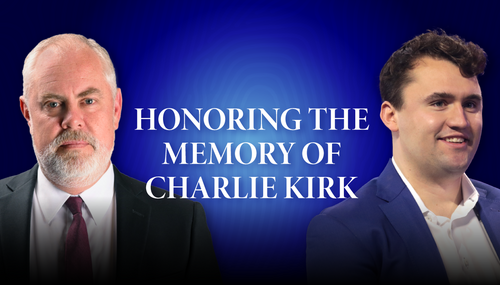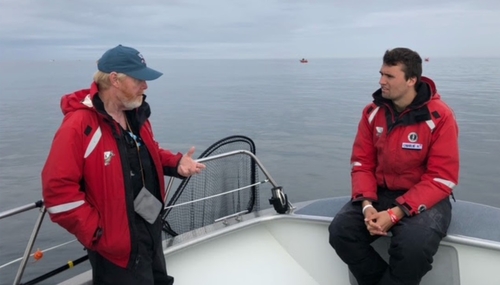 While the liberal media have been trying to scare people into voting for President Biden by insisting Republicans were violent, anti-American terrorists looking to destroy democracy, CBS Mornings proved once again that politically motivated violence was (D)ifferent when it was coming from the left. In hyping a book about “black resistance,” the network elevated a far-left author; and together they tried to dismiss nonviolence as a way to get political change in a country.
While the liberal media have been trying to scare people into voting for President Biden by insisting Republicans were violent, anti-American terrorists looking to destroy democracy, CBS Mornings proved once again that politically motivated violence was (D)ifferent when it was coming from the left. In hyping a book about “black resistance,” the network elevated a far-left author; and together they tried to dismiss nonviolence as a way to get political change in a country.
They were speaking with Professor Kellie Carter Jackson of Wellesley College about her new book We Refuse: A Forceful History of Black Resistance. Co-anchor Gayle King boasted that the book was “about hard conversations, not focused on right or wrong,” but “what works” in terms of getting results for an agenda.
Carter Jackson admitted that she “wrote this book because [she] was mad” and “frustrated” that the Black Lives Matter riots weren’t “achieving the purpose that people had set out to accomplish when they wanted to reckon with all of this racial injustice.”
“And so I think we have this very limited flat, like one-dimensional perspective. When we talk about protests, you know, the question is, are you going to be violent or are you going to be nonviolent? As those are the only options,” she huffed.
She also ridiculously seemed to suggest that white people had “never” experienced hate crimes:
I think about the fact that we`ve never seen four little white girls killed in a church. We`ve never had a white man assassinated in his driveway. We`ve never had a black man be welcomed into a white church, and then him proceed to shoot it up. And so I really wanted to talk about these very skewed ways that we think about violence and how we don`t interrogate the violence of white supremacy enough.
The network’s promotion of political violence became more obvious when co-anchor Vladimir Duthiers hyped a passage from the book denouncing how, “Our culture`s fixation on nonviolence has caused us to miss entire histories of Black responses to white supremacy. Nonviolence on its own is not at all expansive enough to rectify the harm that has been caused by racism.”
Duthiers requested that she “set that in the context of the Haitian Revolution.” Carter Jackson obliged and proceeded to suggest the American Revolution was not a real revolution because slavery remained after we gained our independence:
Well, when we think about revolution, I think we don`t have a proper understanding of it. Because for me, revolution is about replacing an unjust system with a just one. And so in Haiti, the whole purpose was not just to overthrow a colonial power, but to abolish the system of slavery. And that`s what was achieved in Haiti. We don`t have that in the United States, we have an American Revolution, but slavery persists almost for another hundred years after the American Revolution.
Carter Jackson did say, "when we think about black resistance" it's not about choosing "between violence or nonviolence" and that there was an "array of tools." But she warned that one of the "limitations" of nonviolence was that it becomes “performative and not really achieve the goals that we set out to accomplish.”
This whole exchange was eerily similar to when NBC’s Chuck Todd twice gave a platform to Antifa supporter Mark Bray in 2017; just two months after the Congressional Baseball Shooting carried out by a far-left MSNBC fan.
The transcript is below. Click "expand" to read:
CBS Mornings
June 6, 2024
8:18:02 a.m. Eastern(…)
GAYLE KING: Wellesley Professor Kellie Carter Jackson highlights in her new book, it`s called We Refuse: A Forceful History of Black Resistance. And we`re very happy to tell you that she joins us first on CBS Mornings.
Good morning to you, Professor.
KELLIE CARTER JACKSON: Hi.
KING: I learned so much, Professor Carter Jackson things I didn`t know it was -- it was eye opening to me.
And you say in the book: We Refuse is a book about hard conversations, not focused on right or wrong, but what happens, what works when Black resistance and liberation is at the center to understand Black humanity in rage in pursuit of freedom. Wow.
CARTER JACKSON: Yeah, yeah. I wrote this book because I was mad. I wrote this book because I was frustrated and because I had thought about everything that happened in 2020, not just the pandemic, but also this racial reckoning. And I didn`t feel like marches and protests and hashtags were sort of achieving the purpose that people had set out to accomplish when they wanted to reckon with all of this racial injustice.
And so I think we have this very limited flat, like one-dimensional perspective. When we talk about protests, you know, the question is, are you going to be violent or are you going to be nonviolent?
KING: Yes. Yes.
CARTER JACKSON: As those are the only options. And when I think about the history of this country, you know, I think about the fact that we`ve never seen four little white girls killed in a church. We`ve never had a white man assassinated in his driveway. We`ve never had a black man be welcomed into a white church, and then him proceed to shoot it up.
KING: Yes.
CARTER JACKSON: And so I really wanted to talk about these very skewed ways that we think about violence and how we don`t interrogate the violence of white supremacy enough.
VLADIMIR DUTHIERS: One of the things you write in the book, speaking of non-violence: Our culture`s fixation -- I`m quoting the book now -- on nonviolence has caused us to miss entire histories of Black responses to white supremacy. Nonviolence on its own is not at all expansive enough to rectify the harm that has been caused by racism.
I want you to set that in the context of the Haitian Revolution.
CARTER JACKSON: Yeah.
DUTHIERS: Where we saw a revolution that was able, essentially to overthrow the shackles of slavery on what was then the world`s superpower.
CARTER JACKSON: Yeah, yeah. Well, when we think about revolution, I think we don`t have a proper understanding of it. Because for me, revolution is about replacing an unjust system with a just one.
And so in Haiti, the whole purpose was not just to overthrow a colonial power, but to abolish the system of slavery. And that`s what was achieved in Haiti. We don`t have that in the United States, we have an American Revolution, but slavery persists almost for another hundred years after the American Revolution.
And so how should we think of revolutions? And what makes them revolutionary? What really shifts sort of the structures that we live in? And so --
KING: Because you say, they don`t require bloodshed, but they do require sacrifice?
CARTER JACKSON: Absolutely.
KING: And when you look at the cover of your book, We Refuse, it is a Black woman holding a gun. I thought, oh, Kellie is coming in hot. And you say, okay, everybody --
What is -- what is the message that you were really trying to send? Because I looked at it, you`re trying to highlight about black humanity.
CARTER JACKSON: Yes. Yes.
KING: Because so often, black people are seen through the lens of criminality.
CARTER JACKSON: Yes. I wanted to push back on these ideas and say that when we think about black resistance, we have an array of tools in front of us and it is not just force and guns.
I think about revolution, I think about protection. I have a whole chapter on flight and a chapter on joy. Joy, I see has been one of the most potent weapons that we have to fight against, sort of the erosion of white supremacy.
And so I wanted us to have this expansive idea to understand that you don`t just have to choose between violence or nonviolence, that yes, there are certainly limitations to violence. We all understand that.
KING: Yes.
CARTER JACKSON: there`s also limitations to the use of nonviolence and how we think about how quickly it can become performative and not really achieve the goals that we set out to accomplish.
(…)




